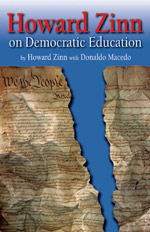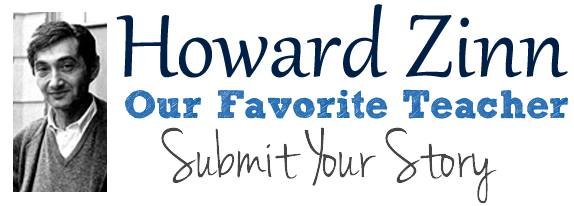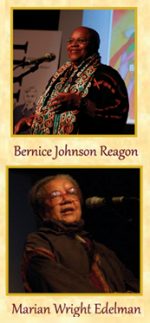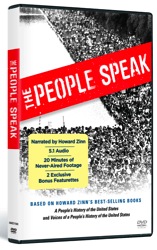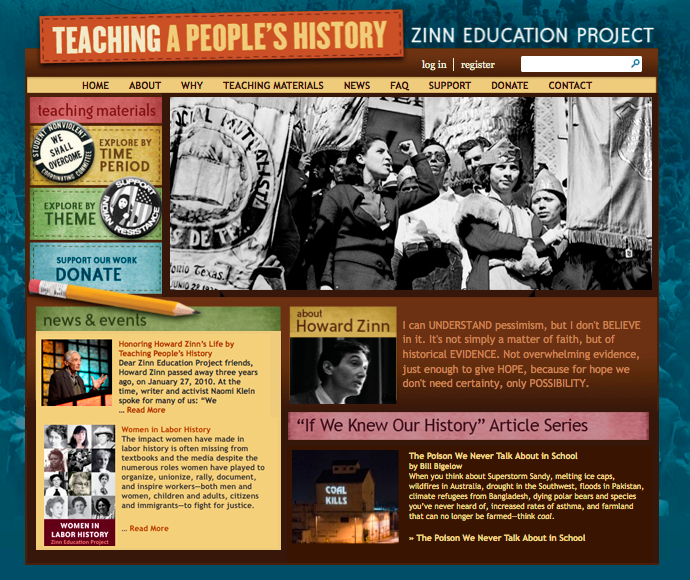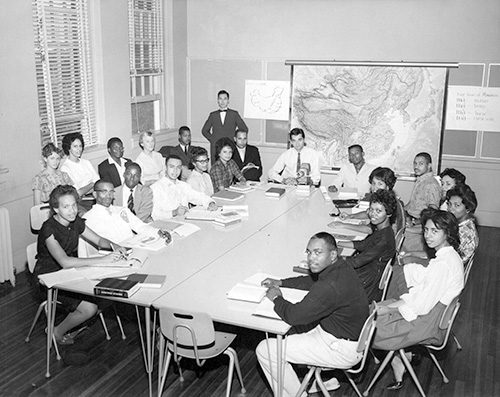
Howard Zinn at Spelman College, 1960. Photographer unknown.
As the school year gets underway, we share this excerpt from Original Zinn: Conversations on History and Politics on democratic education, the value of skepticism, and building trust with students. In this interview with David Barsamian at Alternative Radio, Howard Zinn explains that he built trust with his students “by showing them that outside the classroom I was not retreating into my home and my study. I was involved in the social struggle that related to their lives. When they decided to participate in this struggle, that I was with them, I was walking on picket lines with them, I was engaging in demonstrations with them, I was sitting in with them. And that, more than anything, created an atmosphere of trust, of democracy in our relationship.” Following are related classroom resources.
There are contrasting perspectives on what the term well educated means. What does it mean to you?
There is an orthodox view of what it means to be well educated, and the orthodox view is that a person is well educated who has gone through all the realms of education. And the higher up you go, the more degrees you have, the better educated you are. The more knowledge you have, the more facts you have acquired, the more languages you can speak, the more important people you can quote, the more reading you have done, all of that falls within the orthodox definition of higher education, of education itself, being well educated. And, of course, a lot of that is legitimate; that is, to me a lot of that makes sense.
But it is not sufficient for me. That is, to me being well educated means not just sort of a master of information, not just a quantity of information, but to me being well educated means being educated in what is important and what is not important, educated in having a sense of proportion about what knowledge is significant, what knowledge is not significant, what knowledge is trivial and what knowledge has very powerful ramifications, what knowledge can contribute to the betterment of society and what knowledge is really just sort of static information lying there, whether in the book or in the head, but which has no energy that it propels into society to have an effect on whatever is going on in society.
How do you as a teacher foster that sense of questioning and skepticism, and how do you avoid its going over to its first cousin, cynicism?
Skepticism, being one of the most important qualities that you can educate a student in, I think arises from having the student realize that what has been seen as holy is not holy, what has been revered is not necessarily to be revered. That the acts of the nation that have been romanticized and idealized and presented as marvelous acts, those in fact deserve to be scrutinized and looked at critically. That the actions of the country in which you live, the ideas of the people who have been held up to you as important thinkers, to show the flaws in those ideas, to show the flaws in those actions.
And once a student has learned to be skeptical in one area, then that skepticism carries over. I remember that a friend of mine, Bill Bigelow, who teaches history on the West Coast and who was teaching his kids in high school to be skeptical of what they had learned about Columbus as the great hero and liberator, expander of civilization, that one of his students—her name was Rebecca—said to him, “Well, if I have been so misled about Columbus, I wonder now, what else have I been misled about?” So that is education in skepticism.
Sure, that can carry over into cynicism, but I think the way to avoid that is to give a student information that shows that those ideas, those people, those actions that a student has learned to be skeptical of have also been the objects of other people’s skepticism and also have been the object of other people’s reaction, that these ideas and these actions have not gone unchallenged. The student should learn the history of such challenges to show that the student who is thinking about this is not the first person to be skeptical of this, and that people have not just reacted to their skepticism with passivity and with cynicism, but to show that very often in history people have shown their critical understanding of society by rebelling against what they saw and by organizing to change what they saw was wrong.
When you taught at Spelman College, and later at Boston University, you were teaching kids just coming out of high school. And they come with a lot of baggage, a lot of embedded ideas. How difficult was it for you to reach them?
In the case of teaching at Spelman College, there was a special factor, and that was simply that my students were African American, my students were black, and I was a white teacher. I was one of the a few white teachers in this all-black college. I was for most of the students in my class the first white teacher they had ever encountered.
And therefore, aside from the usual problem of growing to develop a relationship of trust with students, between students and teachers, there was a special problem in this case of black students growing up in a segregated society in which the idea of white supremacy, although they didn’t believe it, was widespread—of persuading such students that they could trust me.
That’s something that could not be done overnight. That’s something that could be done only—and this was what I tried to do—by having them realize that my values and ideas were very different from those of the white-supremacist society they had grown up in, that I believe in the equality of human beings, and that I took the claims of democracy seriously. And to try to break down the barrier between us not only by what I said in the classroom but by how I behaved toward them in the classroom by my accepting of who they were by not indicating that their education had been poor, which it very often was, by not making them feel that they were coming into this classroom handicapped. So I had to break down the barrier between us not only by what I said but by my attitude toward them as students in the classroom.
And also—and this became important at Spelman College—by showing them that outside the classroom I was not retreating into my home and my study, that outside the classroom I was involved in the world outside. I was involved in the social struggle that related to their lives. And that when they decided to participate in this struggle, when my students decided to move out of the classroom and to go into the city of Atlanta and try to desegregate the public library or when they decided to follow the example of the four students in Greensboro, North Carolina, in early 1960 and decided to sit in at places in Atlanta to break down the barrier of segregation, that I was with them, I was supporting them, I was helping them, I was walking on picket lines with them, I was engaging in demonstrations with them, I was sitting in with them. And that more than anything, I think, created an atmosphere of trust, of democracy in our relationship.
More on Howard Zinn as an Educator and Related Classroom Resources
Howard Zinn Archives at Alternative Radio
Howard Zinn on Democratic Education
Howard Zinn on Democratic Education describes what is missing from school textbooks and in classrooms—and how we move beyond these deficiencies to improve student education. Learn more.
Howard Zinn Archives at Alternative Radio
Archives of more than 50 talks and interviews by Howard Zinn on a wide range of topics. Visit Alternative Radio.
Bernice Johnson Reagon and Marian Wright Edelman on Professor Howard Zinn
Bernice Johnson Reagon and Marian Wright Edelman were students of Howard Zinn’s at Spelman College. Watch their testaments about the impact Zinn had on their education from the Zinn Room Dedication, 2011.
The People Speak
Directed by Howard Zinn, Chris Moore, and Anthony Arnove
This feature documentary, inspired by A People’s History of the United States and based on live readings of Voices of a People’s History of the United States, offers readings and performances of letters, diary entries, speeches, and songs from throughout U.S. history. Learn more and see chapters.
Zinn Education Project
Based on the lens of history highlighted in Howard Zinn’s best-selling book A People’s History of the United States, the website offers free, downloadable lessons and articles organized by theme, time period, and reading level. The Zinn Education Project is coordinated by two non-profit organizations, Rethinking Schools and Teaching for Change. Learn more.
Category: Tags: Education, Excerpts, Spelman College, Zinn Education Project


